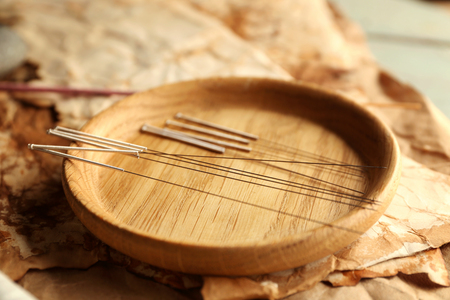Frequently Asked Questions Regarding Acupuncture Therapy
1) What does acupuncture feel like?
The most common sensations you can expect to feel with acupuncture include warmth, pressure, energy traveling, or possibly a deep ache, similar to a sore muscle after a work out. Any sensations you may feel normally dissipate within a minute or two as the acupuncture opens up the flow in the energetic pathway. Most people describe a sensation of ‘circulation’ followed by deep relaxation.
2) Does acupuncture hurt?
In short, acupuncture therapy does not hurt. For the most part, you will not even feel the acupuncture pin. At WellStream Acupuncture, we use Japanese style painless technique. Perception of “pain” and pain tolerance can differ amongst individuals, of course. Therefore, those who are anxious, highly sensitive, stressed, women on their menstrual cycle, or those affected by the full moon may “feel” acupuncture more than others do. Acupuncture is not painful.
3) What are the needles like?
Lots of people have a fear of needles. This is based on their experience getting shots or having blood drawn at the doctor’s office. Acupuncture needles are NOTHING like those needles! An acupuncture ‘pin’ is a more accurate description – as the ‘pin’ is a tiny, solid, thin as a hair ‘needle’. Upon first acupuncture needle insertion and being asked ‘how was that?’, most new patients reply ‘you did it? I didn’t feel a thing!’.
4) How many sessions do I need?
How many sessions you need is dependent on what you are being treated for and how long you’ve had the problem. Acute conditions such as a recent injury or a cold may only take a few sessions. Chronic pain that you’ve had for years, or internal health issues, such as indigestion, insomnia or infertility cannot be expected to be fixed in one session.
Acupuncture is not a silver bullet, single session miracle cure; it is a form of therapy. The effects of acupuncture are cumulative and you will feel progressively better with each session. To get a better prediction of how many sessions you might need for complete healing, you can participate in a few treatments in order to determine how you respond to the therapy.
5) How much does a session cost?
A regular follow up acupuncture session is $125. Cosmetic Facial Acupuncture is $185 per session. The initial visit for a new patient consultation, evaluation and treatment is priced by specialty. Fees are time based and subject to change. You can view the most current price list here.
6) How long is an acupuncture session?
In general, regular follow up acupuncture sessions are 45-60 minutes long. The initial new patient visit with consultation, evaluation and acupuncture treatment varies from 60-120 minutes, depending on the health reason for your visit. Cosmetic acupuncture sessions are approximately 60-75 minutes – longer if facial gua sha is added. The resting time with acupuncture needles is 30 minutes (and most people fall asleep during a session).
7) What does acupuncture treat?
Most people think of acupuncture as a pain relief therapy for chronic back pain or headaches. While acupuncture is great for pain management, it treats most internal medicine health concerns. Acupuncture successfully treats a variety of women’s health issues including menopause, PMS, infertility and nausea during pregnancy. Acupuncture is great for digestive problems, migraines, TMJ, tinnitus, insomnia, emotional stress, anxiety, and more. According to the World Health Organization, acupuncture is proven to treat hundreds of health problems.
8) Can it help with my condition?
Most likely, acupuncture can help with your specific condition. Acupuncture is just one treatment modality, as part of Traditional Asian Medicine, which is a complete medical system to treat all health issues. Cindy Albon, LAc, MSOM, DiplAC, studied in Beijing in the Internal Medicine and Gynecology Departments. During her studies, she observed most everything being successfully treated with acupuncture and herbs. If you are wondering whether or not acupuncture and/or herbal supplements can help your specific condition, give us a call at (323) 620-4934.
9) Are the needles sterile?
Yes, absolutely, the needles are sterile. The olden days of autoclaving to sterilize and reuse needles are gone. Acupuncture needles today are prepackaged, sterile, hair-thin, solid needles. They are used only once and then properly disposed of into a Sharp’s container immediately following. We follow strict clean needle technique guidelines.
10) Is it ok if I fall asleep during a session?
Yes, it is ok to fall asleep during a session. In fact, most people do! If you’re having a session to treat insomnia, it is expected that you will fall asleep. Acupuncture is a wonderful way to relieve stress, in fact, many patients feel more relaxed after an acupuncture session than they do after a professional massage. Some people elect to multi-task during acupuncture using the time to do their meditation, while others like to catch up on pod casts. However, it is recommended to use the 30 minutes resting quietly during acupuncture.
11) How does acupuncture actually work?
Let me answer that question with an eastern and western medicine answer. From a western view point, the acupuncture needles stimulate neurotransmitters to release chemicals such as dopamine and serotonin, providing natural pain relief. Or in a fertility acupuncture session, acupuncture stimulates the pituitary to release or balance hormones for optimal reproductive function. From an eastern view point, our bodies run on “Qi,” a Chinese term for energy. This energy is responsible for circulating the blood, hormones, nutrients and chemicals in our body. Acupuncture stimulates the flow of Qi energy to provide proper, harmonious functioning and balance in our mind, body and spirit.
12) Do medical doctors practice acupuncture?
Generally, medical doctors do not practice acupuncture. There may be a handful of doctors who are open-minded and schooled in natural therapies such as acupuncture. However, most medical doctors prefer to refer patients to licensed acupuncturists who have extensive asian medicine training. In the state of California, licensed acupuncturists are considered primary health practitioners.



